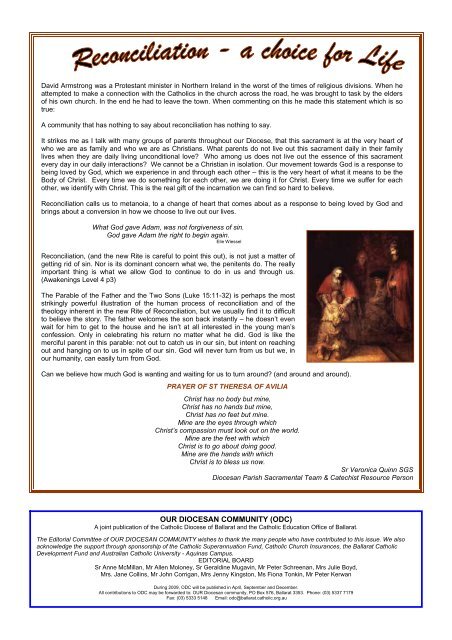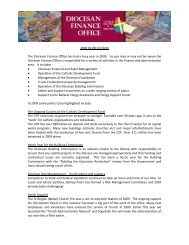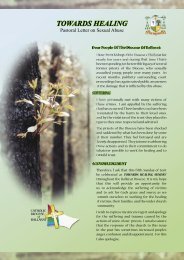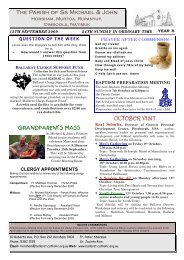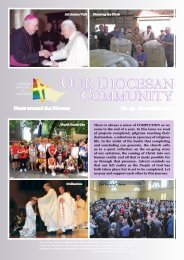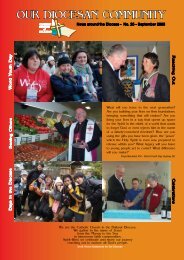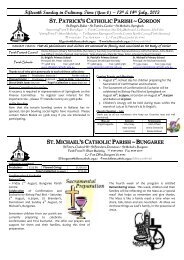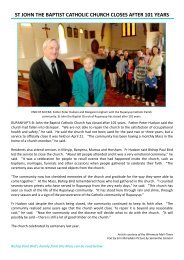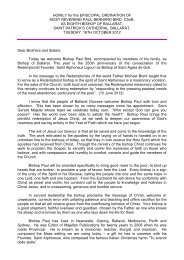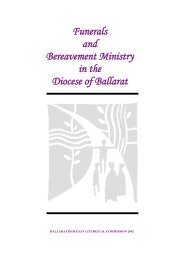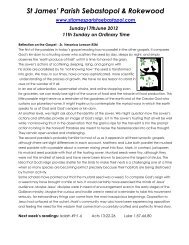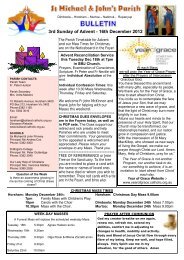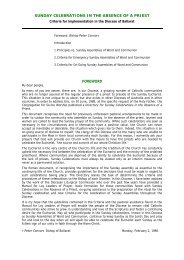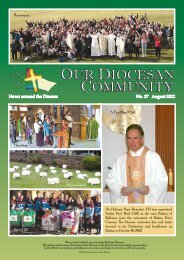our diocesan community - Catholic Diocese of Ballarat - Australian ...
our diocesan community - Catholic Diocese of Ballarat - Australian ...
our diocesan community - Catholic Diocese of Ballarat - Australian ...
- No tags were found...
Create successful ePaper yourself
Turn your PDF publications into a flip-book with our unique Google optimized e-Paper software.
David Armstrong was a Protestant minister in Northern Ireland in the worst <strong>of</strong> the times <strong>of</strong> religious divisions. When heattempted to make a connection with the <strong>Catholic</strong>s in the church across the road, he was brought to task by the elders<strong>of</strong> his own church. In the end he had to leave the town. When commenting on this he made this statement which is sotrue:A <strong>community</strong> that has nothing to say about reconciliation has nothing to say.It strikes me as I talk with many groups <strong>of</strong> parents throughout <strong>our</strong> <strong>Diocese</strong>, that this sacrament is at the very heart <strong>of</strong>who we are as family and who we are as Christians. What parents do not live out this sacrament daily in their familylives when they are daily living unconditional love? Who among us does not live out the essence <strong>of</strong> this sacramentevery day in <strong>our</strong> daily interactions? We cannot be a Christian in isolation. Our movement towards God is a response tobeing loved by God, which we experience in and through each other – this is the very heart <strong>of</strong> what it means to be theBody <strong>of</strong> Christ. Every time we do something for each other, we are doing it for Christ. Every time we suffer for eachother, we identify with Christ. This is the real gift <strong>of</strong> the incarnation we can find so hard to believe.Reconciliation calls us to metanoia, to a change <strong>of</strong> heart that comes about as a response to being loved by God andbrings about a conversion in how we choose to live out <strong>our</strong> lives.What God gave Adam, was not forgiveness <strong>of</strong> sin.God gave Adam the right to begin again.Elie WiesselReconciliation, (and the new Rite is careful to point this out), is not just a matter <strong>of</strong>getting rid <strong>of</strong> sin. Nor is its dominant concern what we, the penitents do. The reallyimportant thing is what we allow God to continue to do in us and through us.(Awakenings Level 4 p3)The Parable <strong>of</strong> the Father and the Two Sons (Luke 15:11-32) is perhaps the moststrikingly powerful illustration <strong>of</strong> the human process <strong>of</strong> reconciliation and <strong>of</strong> thetheology inherent in the new Rite <strong>of</strong> Reconciliation, but we usually find it to difficultto believe the story. The father welcomes the son back instantly – he doesn’t evenwait for him to get to the house and he isn’t at all interested in the young man’sconfession. Only in celebrating his return no matter what he did. God is like themerciful parent in this parable: not out to catch us in <strong>our</strong> sin, but intent on reachingout and hanging on to us in spite <strong>of</strong> <strong>our</strong> sin. God will never turn from us but we, in<strong>our</strong> humanity, can easily turn from God.Can we believe how much God is wanting and waiting for us to turn around? (and around and around).PRAYER OF ST THERESA OF AVILIAChrist has no body but mine,Christ has no hands but mine,Christ has no feet but mine.Mine are the eyes through whichChrist’s compassion must look out on the world.Mine are the feet with whichChrist is to go about doing good.Mine are the hands with whichChrist is to bless us now.Sr Veronica Quinn SGSDiocesan Parish Sacramental Team & Catechist Res<strong>our</strong>ce PersonOUR DIOCESAN COMMUNITY (ODC)A joint publication <strong>of</strong> the <strong>Catholic</strong> <strong>Diocese</strong> <strong>of</strong> <strong>Ballarat</strong> and the <strong>Catholic</strong> Education Office <strong>of</strong> <strong>Ballarat</strong>.The Editorial Committee <strong>of</strong> OUR DIOCESAN COMMUNITY wishes to thank the many people who have contributed to this issue. We alsoacknowledge the support through sponsorship <strong>of</strong> the <strong>Catholic</strong> Superannuation Fund, <strong>Catholic</strong> Church Insurances, the <strong>Ballarat</strong> <strong>Catholic</strong>Development Fund and <strong>Australian</strong> <strong>Catholic</strong> University - Aquinas Campus.EDITORIAL BOARDSr Anne McMillan, Mr Allen Moloney, Sr Geraldine Mugavin, Mr Peter Schreenan, Mrs Julie Boyd,Mrs. Jane Collins, Mr John Corrigan, Mrs Jenny Kingston, Ms Fiona Tonkin, Mr Peter KerwanDuring 2009, ODC will be published in April, September and December.All contributions to ODC may be forwarded to: OUR Diocesan <strong>community</strong>, PO Box 576, <strong>Ballarat</strong> 3353. Phone: (03) 5337 7179Fax: (03) 5333 5148 Email: odc@ballarat.catholic.org.au


